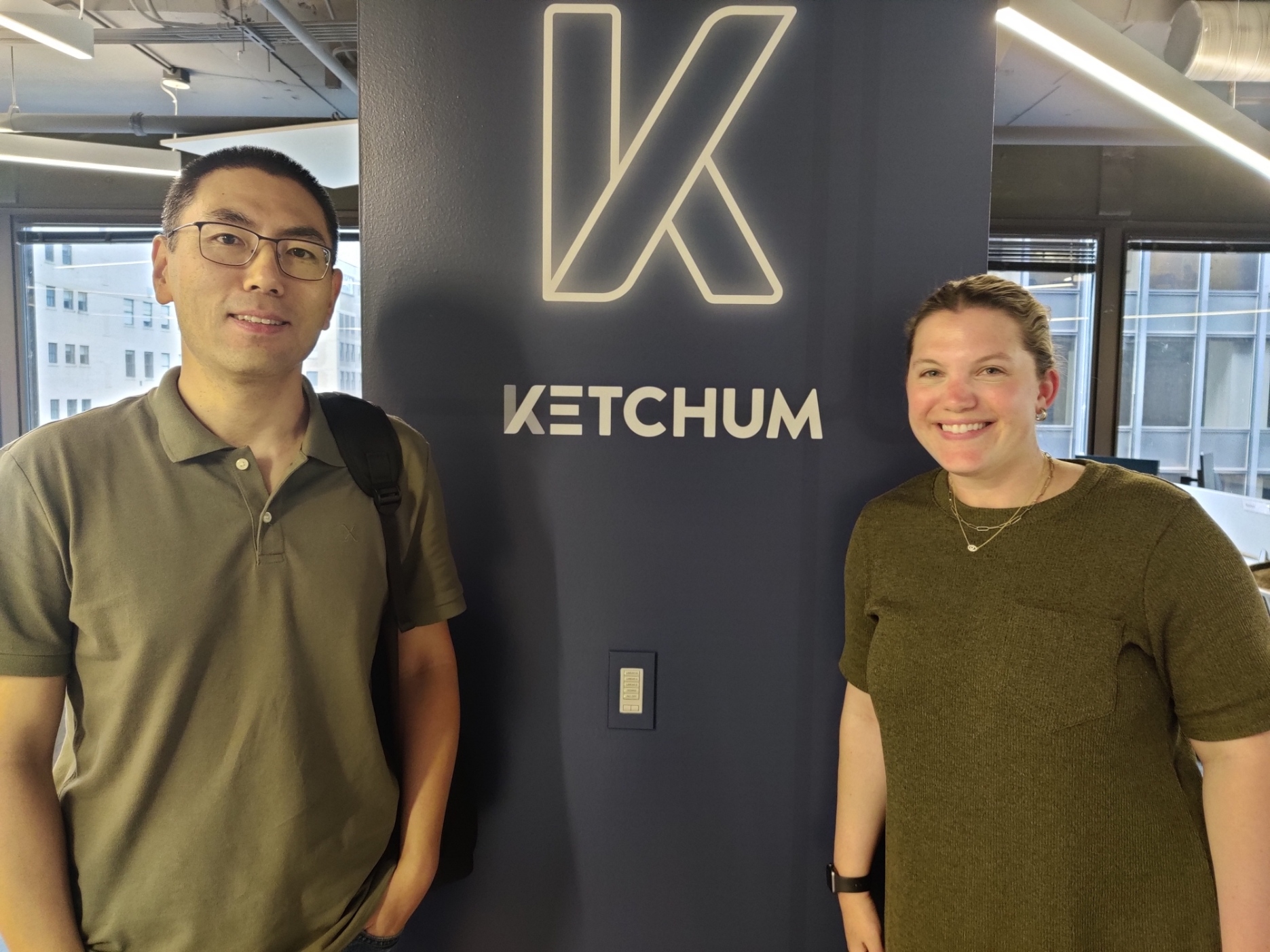Faculty Shadowing Program
Launched in 2024 thanks to the generous support of John Cooper and Lynne Eickholt, the this program supports faculty on-site shadowing at communication agencies and corporations to see firsthand how the needs of the communication field are changing. The program aims to improve teaching, facilitate connections between faculty and organizational leaders and alumni, and create a pipeline for student opportunities.
Communication professor Dr. Xi Cui was selected to be the first participant in the Martin Center Faculty Shadowing Program. During Spring and Summer of 2024, Dr. Cui participated in several virtual meetings with employees of Ketchum, a prestigious international PR firm whose work with clients ranges from Nespresso and Gillette, to UNESCO's #MoveForEquality campaign.
The program culminated in a visit to Ketchum's Chicago and New York offices, where Dr. Cui met in person with employees.
Find Dr. Cui's full story about his experience below!
Encouraging students to continuously update their skills and knowledge will better prepare them for the dynamic nature of the communication field.
Dr. Xi Cui (full blog below)
Dr. Cui meets with Ketchum Employees

Bridging Academia and Industry: My Transformative Faculty Shadowing Experience
Earlier this year, I had the unique opportunity to participate in the inaugural Faculty Shadowing Program at the College of Charleston. This innovative program allows faculty members to shadow industry professionals to enhance their teaching and research. As someone passionate about making communication research methods more relevant and engaging for my students, I was thrilled to join.
With the introduction of Nicole Moreo, a long-time member of the Communication Department’s advisory council, I connected with Lauren Hasse and Devon Bottomley, two research experts at Ketchum, a global Public Relations firm, who welcomed me into their world.
Lauren and Devon quickly arranged a series of meetings and activities to immerse me in their daily operations. What began as a plan to shadow them virtually during my spring break week quickly extended into a month-long deep dive. I attended meetings on a variety of projects, from media landscape analysis and brand-lift surveys to research support for request-for-proposals. By the end of April, I had participated in over 20 meetings, taken 30 pages of single-spaced notes, and conducted 8 individual interviews with Lauren and Devon’s team members ranging from junior analysts to senior consultants.
To say that this experience was eye-opening would be an understatement. It was transformative. Seeing the practical application of research methods I teach was exhilarating. Whether it was survey design, measurement validity, or qualitative coding, every aspect of my course content was in play. One of the highlights was an influencer vetting project that incorporated a comprehensive analysis of the media landscape, brand values, candidate influencers’ audience niches, and performance metrics. This inspired my rethinking of the real-world relevance of research methods, from conceptualization to data analysis.
Determined to delve deeper, I visited Ketchum's offices in Chicago and New York over the summer. This in-person experience allowed me to observe the leadership and teamwork dynamics firsthand. Lauren and Devon's ability to lead with genuine care, facilitate collaboration, and provide constructive feedback was inspiring. Their skill in fostering a supportive environment underscored the importance of soft skills in research, beyond technical expertise.
Throughout my shadowing, I engaged with young analysts who shared their journeys from academia to industry. They reflected on their college research methods classes, the learning experiences on the job, and the new tools and perspectives they had gained. Their stories revealed gaps between academic research and industry practices, highlighting areas where I could help bridge these gaps in my teaching. Our conversations pointed to things as small as query writing for data retrieval and as big as how to more effectively cultivate students’ ability to conceptualize and think abstractly.
This transformational experience led me to refine my teaching approach. I plan to design more piecemeal assignments that build conceptual depth incrementally, helping students connect the dots through smaller, manageable tasks. This approach would differ from teaching research methods by following the research process linearly, where students can easily get overwhelmed by the required conceptual depth up front. Instead, students can tackle specific parts of a project like a junior analyst without always seeing the bigger picture initially. By building skills and confidence gradually, students can achieve deeper insights and greater competence. Additionally, these industry-based scenarios not only serve as examples of research skills but also provide opportunities for critical reflections on the role of communication in society.
Moreover, I aim to emphasize the importance of lifelong learning and staying updated with new tools and skills. Providing students with resources, from templates to micro-credential modules, will be a key focus. Encouraging students to continuously update their skills and knowledge will better prepare them for the dynamic nature of the communication field.
I am profoundly grateful to the the Martin Center for Mentorship, John Cooper and Lynne Eickholt for their generous donation to establish the faculty shadowing program, and to Ketchum, especially Lauren Hasse, Devon Bottomley, and their colleagues, for their hospitality and generosity. Their openness allowed me to gain insights that will significantly impact my teaching and my students' learning in the years to come. Thank you to all who made this possible. Your support and vision are shaping the future of education and professional practice in communication.
Dr. Xi Cui
College of Charleston Department of Communication
July 2024